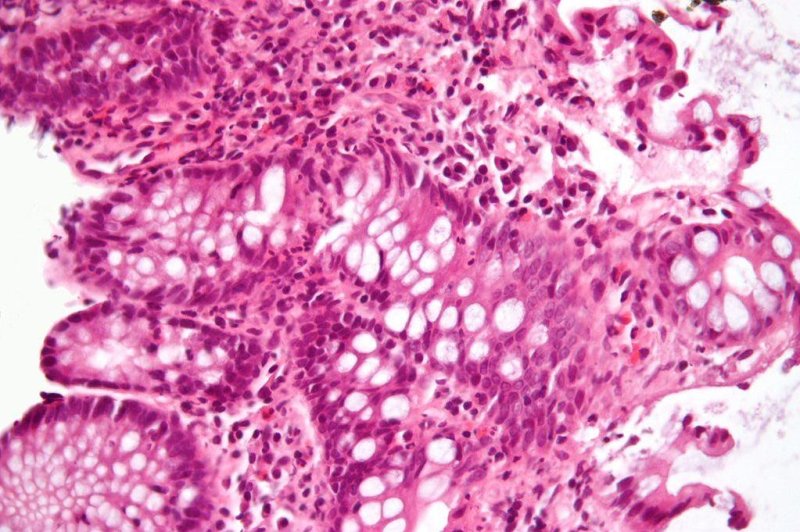An up close look at Crohn's disease. (CC/Nephron)
CINCINNATI, April 22 (UPI) -- More than 1.4 million Americans suffer from the painful symptoms of inflammatory bowel disease, a group of disorders, like Crohn's disease and ulcerative colitis, resulting from chronic inflammation of the intestines.
There is currently no cure for these conditions, but scientists hope a new discovery into the genetic origins of the disease can eventually help alleviate the pain of IBD sufferers.
Researchers at the Cincinnati Cancer Center and University of Cincinnati Cancer Institute have located two genes associated with IBD conditions, a receptor and a protein -- specifically, the Ron receptor tyrosine kinase and its partner hepatocyte growth factor-like protein (HGFL).
"Genome-wide linkage studies have identified the Ron receptor tyrosine kinase and its hepatocyte growth factor-like protein (HGFL) as genes highly associated with IBD,” explained Susan Waltz, professor in the department of cancer biology at the University of Cincinnati.
To better understand what role Ron and HGFL played in enabling IBD, the Cincinnati researchers analyzed the intestines of animals with colitis -- a welling of the large intestine and a potentially pre-cancerous condition. Half the test subjects had the Ron receptor removed from their genome.
"We found that genetic loss of Ron led to aggressive inflammation and damage to the colon of models with IBD,” said researcher Rishikesh Kulkarni, a postdoctoral fellow in UC’s department of cancer biology.
The findings suggest Ron and HGFL may play an important role in mitigating IBD, not enabling it. The Ron receptor's primary function is promoting cell growth, so a healthy, high-functioning Ron pathway may enable troubled intestines to better repair damages.
"In addition, there are a number of small changes called single nucleotide polymorphisms (SNP) in humans which map to both the Ron and HGFL gene and have been identified to strongly associate IBD disease in humans," Waltz added. "Our studies suggest that these SNPs may reduce the function of Ron and HGFL leading to chronic intestinal inflammation and damage."
Waltz and her colleagues say more research is necessary to figure out exactly how doctors might tap into the Ron signaling pathway to mitigate IBD conditions, but they are hopeful this latest discovery brings researchers a step closer to a cure.
The study was recently published online in the American Journal of Physiology-Gastrointestinal and Liver Physiology.















